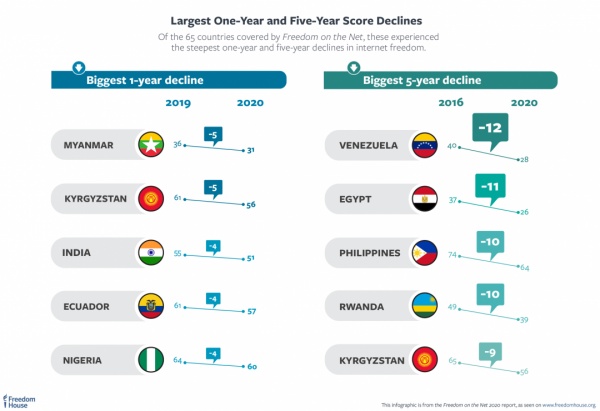How free is the internet in 2020?
Less than before. Don’t let the pandemic hide that.
With COVID-19 limiting movements, connectivity is not a convenience, but a necessity.
But, while more human activities go online to prevent the spread of COVID-19, the coronavirus has actually made the internet less free than before in many parts of the world.
For the 10th consecutive year, internet users worldwide have experienced an overall deterioration in their rights, and a broader crisis for democracy worldwide. Political leaders are using the pandemic to:
- suppress access to information under the guise of combating fake news
- justify online surveillance that otherwise would be deemed too intrusive
- break up the World Wide Web with so-called “cyber sovereignty” regulations that are drawing national borders on the online distribution of information
For example:

Declines in internet freedom scores
</em></u>
- Some states shut off connectivity for marginalized groups, extending and deepening existing digital divides.
- Governments and private entities are ramping up their use of opaque, unaccountable digital tools to make decisions that affect individuals' economic, social, and political rights.
- The United States and India banned many popular Chinese apps, citing national security concerns.
- Legislators in Brazil, Nigeria, and Turkey passed or considered regulations requiring companies to keep user data from leaving the country, meaning law enforcement agencies would have easier access to sensitive information.
- India, the world’s largest democracy remains the world leader in internet shutdowns
First, do not forget what you just read
These days, our minds are understandably filled with COVID-19, and what will happen after it. But what will happen after will, in the long run, be heavily influenced by actions like those above. For better or for worse, most of those actions _“serve to legitimize the push for each state to oversee its own “national internet””, and it very hard to imagine what the result would be like.
So, don’t forget internet freedom. To protect it, in your own interest:
- learn more about current attacks to internet freedom where I took all the quotes above: the Freedom House 2020 report on the state of internet freedom
- Keep reading this website, of course. Here is why, and how to support it
Who writes this, why, and how to help
I am Marco Fioretti, tech writer and aspiring polymath doing human-digital research and popularization.
I do it because YOUR civil rights and the quality of YOUR life depend every year more on how software is used AROUND you.
To this end, I have already shared more than a million words on this blog, without any paywall or user tracking, and am sharing the next million through a newsletter, also without any paywall.
The more direct support I get, the more I can continue to inform for free parents, teachers, decision makers, and everybody else who should know more stuff like this. You can support me with paid subscriptions to my newsletter, donations via PayPal (mfioretti@nexaima.net) or LiberaPay, or in any of the other ways listed here.THANKS for your support!